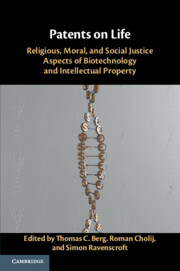 Patents on Life
Patents on Life Book contents
- Patents on Life
- Patents on Life
- Copyright page
- Contents
- Contributors
- Prefatory Note and Acknowledgements
- Opening
- I Life Patents, Law, and Morality
- 2 Morality, Religion, and Patents
- 3 Religious and Moral Grounds for Patent-Eligible Subject Matter Exclusions
- 4 Life-Form Patents: Proceedings in the European Patent Office and the Role of Non-commercial Parties
- II Religious Perspectives on Life Patents
- III Social Justice and Political Aspects
- Closing
- Index
2 - Morality, Religion, and Patents
from I - Life Patents, Law, and Morality
Published online by Cambridge University Press: 28 September 2019
- Patents on Life
- Patents on Life
- Copyright page
- Contents
- Contributors
- Prefatory Note and Acknowledgements
- Opening
- I Life Patents, Law, and Morality
- 2 Morality, Religion, and Patents
- 3 Religious and Moral Grounds for Patent-Eligible Subject Matter Exclusions
- 4 Life-Form Patents: Proceedings in the European Patent Office and the Role of Non-commercial Parties
- II Religious Perspectives on Life Patents
- III Social Justice and Political Aspects
- Closing
- Index
Summary
This chapter advances the argument that religious and ethical reasoning have a role to play in policy debates about patent law, and also in some patent law cases. We begin at the most general level, by arguing that in democratic, pluralist societies, moral and religious argument have a legitimate contribution to make to public discourse tout court. We then make a case for the relevance of religious and moral deliberation for patent law in particular, given that inventions and new technologies that seek patent protection sometimes have significant repercussions for wider society, and patent protection is a way of encouraging and supporting their development. We also consider ways in which religion and ethics might be said to count as relevant evidence not only in patent policy debates, but also in patent proceedings. We address this against the background of the ‘politics of knowledge’ that has arisen in Europe and the United States, and include reference to the explicit immorality exclusion found in European patent legal systems. Given that the interpretation and application of the immorality exclusion has been controversial with lawyers, we finally propose an alternative, potentially more fruitful approach to the exclusion, treating it as a ‘policy lever’.
Keywords
Information
- Type
- Chapter
- Information
- Patents on LifeReligious, Moral, and Social Justice Aspects of Biotechnology and Intellectual Property, pp. 25 - 37Publisher: Cambridge University PressPrint publication year: 2019